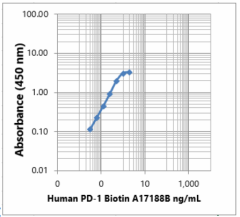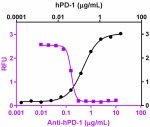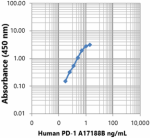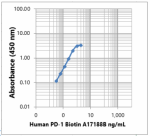- Clone
- A17188B (See other available formats)
- Regulatory Status
- RUO
- Other Names
- PD1, PDCD1
- Isotype
- Mouse IgG2b, κ
- Ave. Rating
- Submit a Review
- Product Citations
- publications

-

Direct ELISA showing biotin anti-human PD-1 (clone A17188B) bound to plate-immobilized recombinant Human PD-1 (CD279)-Fc Chimera protein (Cat. Nos. 785102, 785104, 785106 or 785108). The wells were incubated with serially diluted primary biotin antibody at room temperature for 2 hours in 1% BSA-PBS, followed by incubation with HRP Avidin (Cat. No. 405103). TMB High Sensitivity Substrate Solution (Cat. No. 421501) was used for detection. Absorbance was measured at 450 nm.
| Cat # | Size | Price | Quantity Check Availability | Save | ||
|---|---|---|---|---|---|---|
| 621627 | 50 µg | 396€ | ||||
Programmed cell death protein 1 (PD-1), also known as CD279, is a 55 kD member of the immunoglobulin superfamily. CD279 contains the immunoreceptor tyrosine-based inhibitory motif (ITIM) in the cytoplasmic region and plays a key role in peripheral tolerance and autoimmune disease. CD279 is expressed predominantly on activated T cells, B cells, and myeloid cells. PD-L1 (B7-H1, CD274) and PD-L2 (B7-DC, CD273) are ligands of CD279 (PD-1) and are members of the B7 gene family. Evidence suggests overlapping functions for these two PD-1 ligands and their constitutive expression on some normal tissues and upregulation on activated antigen-presenting cells. Interaction of CD279 ligands results in inhibition of T cell proliferation and cytokine secretion.
Product DetailsProduct Details
- Verified Reactivity
- Human
- Antibody Type
- Monoclonal
- Host Species
- Mouse
- Immunogen
- Recombinant human CD279 protein
- Formulation
- Phosphate-buffered solution, pH 7.2, containing 0.09% sodium azide
- Preparation
- The antibody was purified by affinity chromatography and conjugated with biotin under optimal conditions.
- Concentration
- 0.5 mg/mL
- Storage & Handling
- The antibody solution should be stored undiluted between 2°C and 8°C. Do not freeze.
- Application
-
Direct ELISA - Quality tested
- Recommended Usage
-
Each lot of this antibody is quality control tested by Direct ELISA. The optimal concentration of this reagent for the specific application and the experiment design should be established by the end-user.
- Application Notes
-
A17188B antibody can block the binding of NAT105 and EH12.2H7 antibodies to the target.
- Additional Product Notes
-
This product is intended for sandwich-based immunoassay development on various assay platforms requiring antibody pairs. This antibody (clone A17188B) could function as a detection antibody when paired with purified anti-human PD-1 antibody (Cat. No. TBD) (clone A20074H) as the capture antibody and using Recombinant Human PD-1 (CD279)-Fc Chimera protein (Cat. Nos. 785102, 785104, 785106 or 785108) as the assay standard.
- RRID
-
AB_3097285 (BioLegend Cat. No. 621627)
Antigen Details
- Structure
- 55 kD type I transmembrane protein
- Distribution
-
Transiently expressed on CD4- and CD8- thymocytes, upregulated in thymocytes and splenic T and B lymphocytes, and is expressed on activated myeloid cells.
- Function
- Signaling and co-stimulation (co-inhibition)
- Interaction
- SHP-1 and SHP-2
- Ligand/Receptor
- PD-L1 (CD274) and PD-L2 (CD273)
- Cell Type
- Lymphocytes, T cells
- Biology Area
- Cell Biology, Immuno-Oncology, Inhibitory Molecules
- Molecular Family
- CD Molecules
- Antigen References
-
- Ishida Y, et al. 1992. EMBO J. 11:3887
- Francisco LM, et al. 2010. Immunol Rev. 236:219
- Gene ID
- 5133 View all products for this Gene ID
- UniProt
- View information about CD279 on UniProt.org
Related FAQs
- How many biotin molecules are per antibody structure?
- We don't routinely measure the number of biotins with our antibody products but the number of biotin molecules range from 3-6 molecules per antibody.
Other Formats
View All CD279 Reagents Request Custom Conjugation| Description | Clone | Applications |
|---|---|---|
| Ultra-LEAF™ Purified anti-human CD279 (PD-1) | A17188B | Block |
| Purified anti-human CD279 (PD-1) | A17188B | FC,Direct ELISA |
| PE anti-human CD279 (PD-1) | A17188B | FC |
| APC anti-human CD279 (PD-1) | A17188B | FC |
| FITC anti-human CD279 (PD-1) | A17188B | FC |
| PerCP/Cyanine5.5 anti-human CD279 (PD-1) | A17188B | FC |
| PE/Cyanine7 anti-human CD279 (PD-1) | A17188B | FC |
| TotalSeq™-D1169 anti-human CD279 (PD-1) | A17188B | PG |
| APC/Fire™ 810 anti-human CD279 (PD-1) | A17188B | FC |
| PE/Fire™ 640 anti-human CD279 (PD-1) | A17188B | FC |
| PE/Fire™ 700 anti-human CD279 (PD-1) | A17188B | FC |
| PE/Fire™ 810 anti-human CD279 (PD-1) | A17188B | FC |
| Biotin anti-human CD279 (PD-1) | A17188B | Direct ELISA |
| PE/Dazzle™ 594 anti-human CD279 (PD-1) | A17188B | FC |
| KIRAVIA Blue 520™ anti-human CD279 (PD-1) | A17188B | FC |
| Spark Red™ 718 anti-human CD279 (PD-1) | A17188B | FC |
Compare Data Across All Formats
This data display is provided for general comparisons between formats.
Your actual data may vary due to variations in samples, target cells, instruments and their settings, staining conditions, and other factors.
If you need assistance with selecting the best format contact our expert technical support team.
-
Ultra-LEAF™ Purified anti-human CD279 (PD-1)

Recombinant hPD-1 binds to hPD-L1. Anti-human PD-1 Antibody ... -
Purified anti-human CD279 (PD-1)

PHA-stimulated (3 days) human peripheral blood lymphocytes w... 
Direct ELISA showing purified anti-human PD-1 (clone A17188B... -
PE anti-human CD279 (PD-1)

PHA-stimulated (day-3) human peripheral blood lymphocytes we... -
APC anti-human CD279 (PD-1)

PHA-stimulated (day-3) human peripheral blood lymphocytes we... -
FITC anti-human CD279 (PD-1)

PHA-stimulated (day-3) human peripheral blood lymphocytes we... -
PerCP/Cyanine5.5 anti-human CD279 (PD-1)

PHA-stimulated (day-3) human peripheral blood lymphocytes we... -
PE/Cyanine7 anti-human CD279 (PD-1)

PHA-stimulated (day-3) human peripheral blood lymphocytes we... -
TotalSeq™-D1169 anti-human CD279 (PD-1)
-
APC/Fire™ 810 anti-human CD279 (PD-1)

PHA-stimulated (three days) human peripheral blood lymphocyt... -
PE/Fire™ 640 anti-human CD279 (PD-1)

PHA-stimulated (three days) human peripheral blood lymphocyt... -
PE/Fire™ 700 anti-human CD279 (PD-1)

PHA-stimulated (three days) human peripheral blood lymphocyt... -
PE/Fire™ 810 anti-human CD279 (PD-1)

PHA-stimulated (three days) human peripheral blood lymphocyt... -
Biotin anti-human CD279 (PD-1)

Direct ELISA showing biotin anti-human PD-1 (clone A17188B) ... -
PE/Dazzle™ 594 anti-human CD279 (PD-1)

PHA-stimulated (three days) human peripheral blood lymphocyt... -
KIRAVIA Blue 520™ anti-human CD279 (PD-1)

PHA-stimulated (three days) human peripheral blood lymphocyt... -
Spark Red™ 718 anti-human CD279 (PD-1)

Human peripheral blood lymphocytes were stained with anti-hu...
 Login / Register
Login / Register 










Follow Us